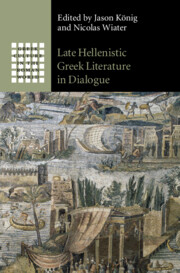Book contents
- Late Hellenistic Greek Literature in Dialogue
- Greek Culture in the Roman World
- Late Hellenistic Greek Literature in Dialogue
- Copyright page
- Contents
- Figure
- Contributors
- Preface
- Abbreviations
- Introduction
- Chapter 1 The Empire Becomes a Body
- Chapter 2 Pyrenaean Mountains and Deep-Valleyed Alps
- Chapter 3 Sailing the Sea, Sailing an Image
- Chapter 4 Ecocritical Readings in Late Hellenistic Literature
- Chapter 5 Civic and Counter-Civic Cosmopolitanism
- Chapter 6 The Wrath of the Sibyl
- Chapter 7 Imagining Belonging
- Chapter 8 Philosophical Self-Definition in Strabo’s Geography
- Chapter 9 Narrating ‘the Swarm of Possibilities’
- Chapter 10 ‘Asianist’ Style in Hellenistic Oratory and Philostratus’ Lives of the Sophists
- Chapter 11 Greek Reading Lists from Dionysius to Dio
- Chapter 12 Envoi
- References
- Index Locorum
- General Index
Chapter 12 - Envoi
To Live in Hellenistic Times
Published online by Cambridge University Press: 21 April 2022
- Late Hellenistic Greek Literature in Dialogue
- Greek Culture in the Roman World
- Late Hellenistic Greek Literature in Dialogue
- Copyright page
- Contents
- Figure
- Contributors
- Preface
- Abbreviations
- Introduction
- Chapter 1 The Empire Becomes a Body
- Chapter 2 Pyrenaean Mountains and Deep-Valleyed Alps
- Chapter 3 Sailing the Sea, Sailing an Image
- Chapter 4 Ecocritical Readings in Late Hellenistic Literature
- Chapter 5 Civic and Counter-Civic Cosmopolitanism
- Chapter 6 The Wrath of the Sibyl
- Chapter 7 Imagining Belonging
- Chapter 8 Philosophical Self-Definition in Strabo’s Geography
- Chapter 9 Narrating ‘the Swarm of Possibilities’
- Chapter 10 ‘Asianist’ Style in Hellenistic Oratory and Philostratus’ Lives of the Sophists
- Chapter 11 Greek Reading Lists from Dionysius to Dio
- Chapter 12 Envoi
- References
- Index Locorum
- General Index
Summary
This chapter is a response to the volume’s arguments. It explores the book’s two central claims – that literary works must be seen as products of their time, and are best understood as being in dialogue with one another. It argues that ‘being of one’s time’ is a complex idea that requires a sophisticated sense of ‘situatedness’. Specifically, it first explores how the imperial and colonial conditions of Hellenistic culture produce contested performances of belonging that change over time as the imaginary of empire is constructed. Second, it looks at how ‘dialogues’ between texts are gestures of self-authorisation for ancient writers and for modern historians. Third, it draws attention to the physical affordances of the construction of belonging – from how a person speaks and walks to the material culture of empire. Finally, it suggests that the book’s unwillingness to discuss the full range of, say, Jewish Greek writing from the period restricts how we can understand cultural translation and cultural belonging in the Hellenistic age, and produces a potentially misleading literary history of the era.
- Type
- Chapter
- Information
- Late Hellenistic Greek Literature in Dialogue , pp. 351 - 365Publisher: Cambridge University PressPrint publication year: 2022

